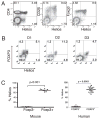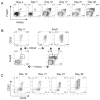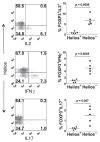Expression of Helios, an Ikaros transcription factor family member, differentiates thymic-derived from peripherally induced Foxp3+ T regulatory cells
- PMID: 20181882
- PMCID: PMC3725574
- DOI: 10.4049/jimmunol.0904028
Expression of Helios, an Ikaros transcription factor family member, differentiates thymic-derived from peripherally induced Foxp3+ T regulatory cells
Abstract
Helios, a member of the Ikaros transcription factor family, is preferentially expressed at the mRNA level by regulatory T cells (Treg cells). We evaluated Helios protein expression using a newly generated mAb and demonstrated that it is expressed in all thymocytes at the double negative 2 stage of thymic development. Although Helios was expressed by 100% of CD4(+)CD8(-)Foxp3(+) thymocytes, its expression in peripheral lymphoid tissues was restricted to a subpopulation ( approximately 70%) of Foxp3(+) T cells in mice and humans. Neither mouse nor human naive T cells induced to express Foxp3 in vitro by TCR stimulation in the presence of TGF-beta expressed Helios. Ag-specific Foxp3(+) T cells induced in vivo by Ag feeding also failed to express Helios. Collectively, these results demonstrate that Helios is potentially a specific marker of thymic-derived Treg cells and raises the possibility that a significant percentage of Foxp3(+) Treg cells are generated extrathymically.
Conflict of interest statement
The authors have no financial conflicts of interest.
Figures







Comment in
-
Comment on "Expression of Helios, an Ikaros transcription factor family member, differentiates thymic-derived from peripherally induced Foxp3+ T regulatory cells".J Immunol. 2010 Dec 15;185(12):7129; author reply 7130. doi: 10.4049/jimmunol.1090105. J Immunol. 2010. PMID: 21127313 No abstract available.
References
-
- Shevach EM. Mechanisms of foxp3+ T regulatory cell-mediated suppression. Immunity. 2009;30:636–645. - PubMed
-
- Curotto de Lafaille MA, Lafaille JJ. Natural and adaptive foxp3+ regulatory T cells: more of the same or a division of labor? Immunity. 2009;30:626–635. - PubMed
-
- Bennett CL, Christie J, Ramsdell F, Brunkow ME, Ferguson PJ, Whitesell L, Kelly TE, Saulsbury FT, Chance PF, Ochs HD. The immune dysregulation, polyendocrinopathy, enteropathy, X-linked syndrome (IPEX) is caused by mutations of FOXP3. Nat Genet. 2001;27:20–21. - PubMed
-
- Wildin RS, Ramsdell F, Peake J, Faravelli F, Casanova JL, Buist N, Levy-Lahad E, Mazzella M, Goulet O, Perroni L, et al. X-linked neonatal diabetes mellitus, enteropathy and endocrinopathy syndrome is the human equivalent of mouse scurfy. Nat Genet. 2001;27:18–20. - PubMed
Publication types
MeSH terms
Substances
Grants and funding
LinkOut - more resources
Full Text Sources
Other Literature Sources
Molecular Biology Databases
Research Materials

